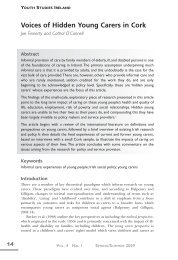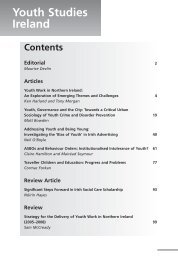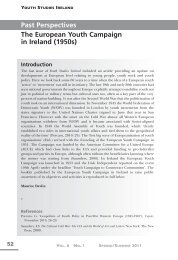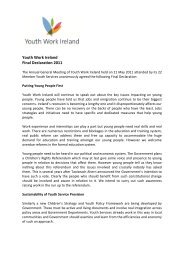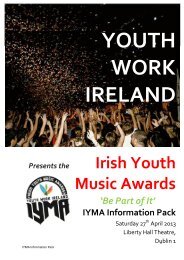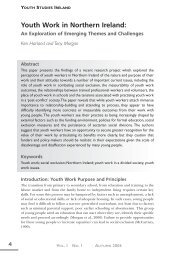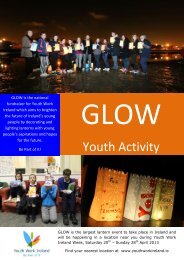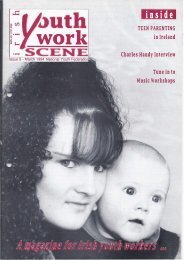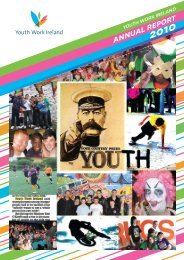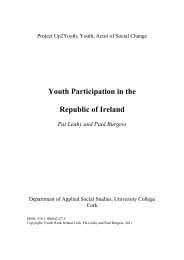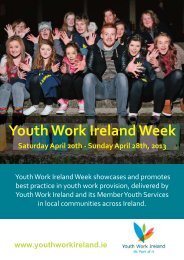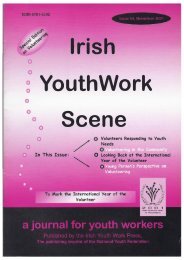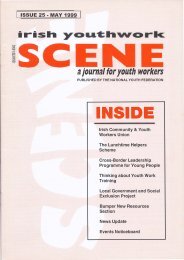Issue 31: March 2001 - Youth Work Ireland
Issue 31: March 2001 - Youth Work Ireland
Issue 31: March 2001 - Youth Work Ireland
You also want an ePaper? Increase the reach of your titles
YUMPU automatically turns print PDFs into web optimized ePapers that Google loves.
office than by active Gardai themselves. Perhaps anentirely separate agency should be created with aspecific remit in this area.These are not unreasonable views. But, it seems tome, that the Gardai are ideally positioned toundertake this task as they are now to the forefrontin child protection and welfare and are accumulatingincreasingly sophisticated ways of working withvulnerable populations.ConclusionAll of us involved in the field of child and youth caremust continue to exert pressure on politicians,relevant personnel in the Government Departmentsand the police to ensure that this issue does not fallto the bottom of an admittedly overworked agenda.Students must be rigorously assessed and, as withgraduate practitioners, monitored by the police andthe colleges to ensure that they do not obtain acriminal record that would make them unsuitable forwork with vulnerable populations.In the meantime, the Irish Association of Social CareEducators has insisted that each of our CYCstudents obtain some form of Garcia clearance bythe end of term one 2000 to protect both them, andus, (as educators) should an issue arise around theirlegal status to practice in social care. It isunfortunate that we have moved into the newMillennium without having obtained such basicprotection for vulnerable populations.ReferencesO' Donaghue, J. (2000). Communication to MildredFox, TD. 18.4.00Task Force Report on Child Care Services.(1980). Dublin: Government Publications.About the AuthorC. Niall McElwee has been lecturing andresearching in the field of social care for a decade.He is Director of Social Care Programmes at theWaterford Institute of Technology, Academic Coordinatorof the Centre for Social Care Research atthat college, founder and Editor of the Irish Journalof Applied Social Studies and is currently Presidentof the Irish Association of Social Care Educators. Heis the author of Children At Risk ( 1996) and To TravelHopefully. Views from the Managers of ResidentialChild Care Units in <strong>Ireland</strong> (2000).He is also co-author of a number of books includingProstitution in Waterford City: A ContemporaryAnalysis (1997), Irish Society: A Reader in AppliedSocial Studies (1997), Worthy Not Worthwhile:Choosing Careers in Caring Occupations (2000).His forthcoming textbook is titled Five Scenarios andSolutions for the Social Care Practitioner (<strong>2001</strong>). He Cis also a frequent media commentator in the area of 0social issues and has a consultancy practice based Min County Kilkenny.Footnotesc0MMENTc0MMENTc0MMENTMENTIrish Association of Social Care Educators.(2000).Internal Memorandum to members.Keating, T. (2000). Letter to Irish Association ofSocial Care Educators. 6.6.00.Kennedy Report. (1970). Dublin: Government of Parliament.1 The Irish Association of Social Care Educators wasestablished to advocate on behalf of educators,students and graduates in the field of child and youthcare.2 A TD is a member of Dail Eireann, the Irish HousePublications3 Seven Institutes of Technology (and St. Patrick'sMcElwee, C. N. (2000). To Travel Hopefully: Views College Carlow) provide third level training andfrom the Managers of Residential Child Care in education of social care practitioners/child and youth<strong>Ireland</strong>. Waterford: RMNCentre for Social Care care workers from Certificate to Diploma to DegreeResearch.level (with the exception of Carlow which ceasesprogrammes at Diploma level).McHugh, J. (2000). Personal Correspondence toAuthor.Irish <strong>Youth</strong><strong>Work</strong> Scene 8<strong>March</strong> <strong>2001</strong>c0MMENTc0ENT



